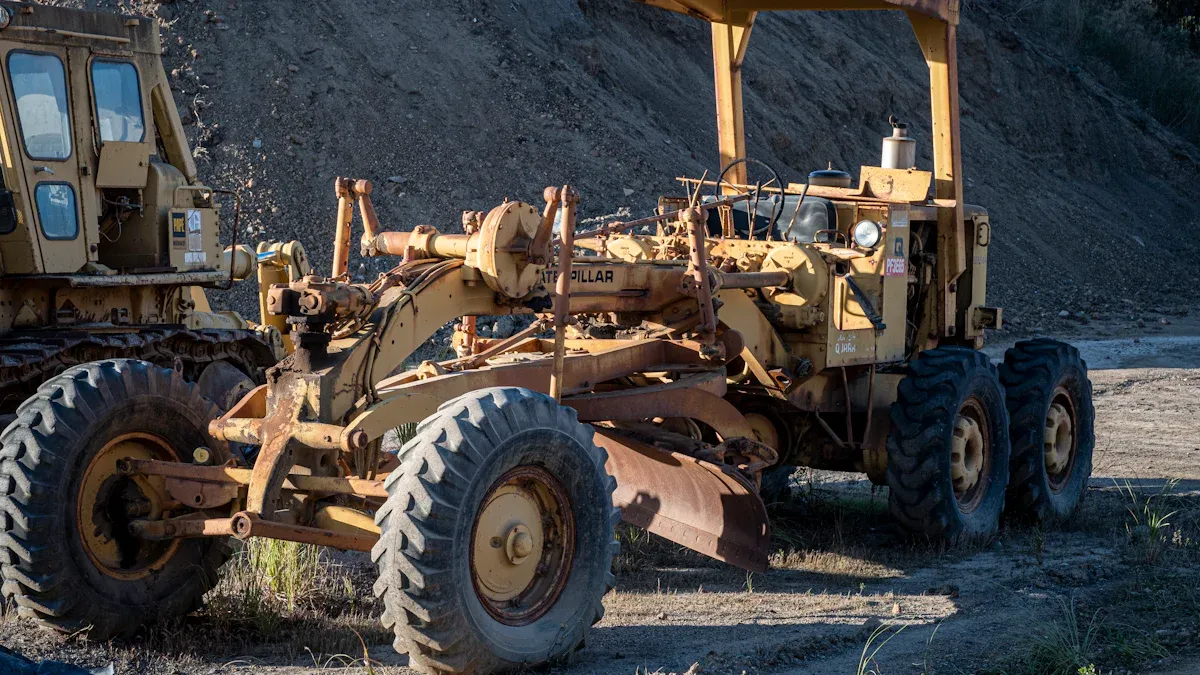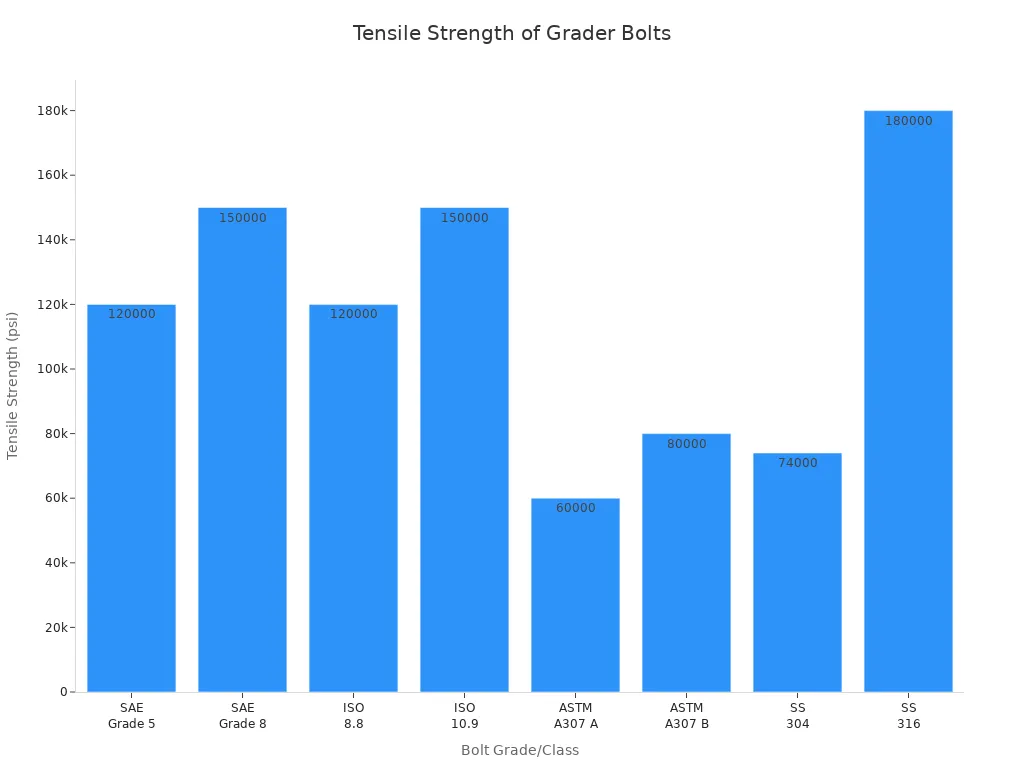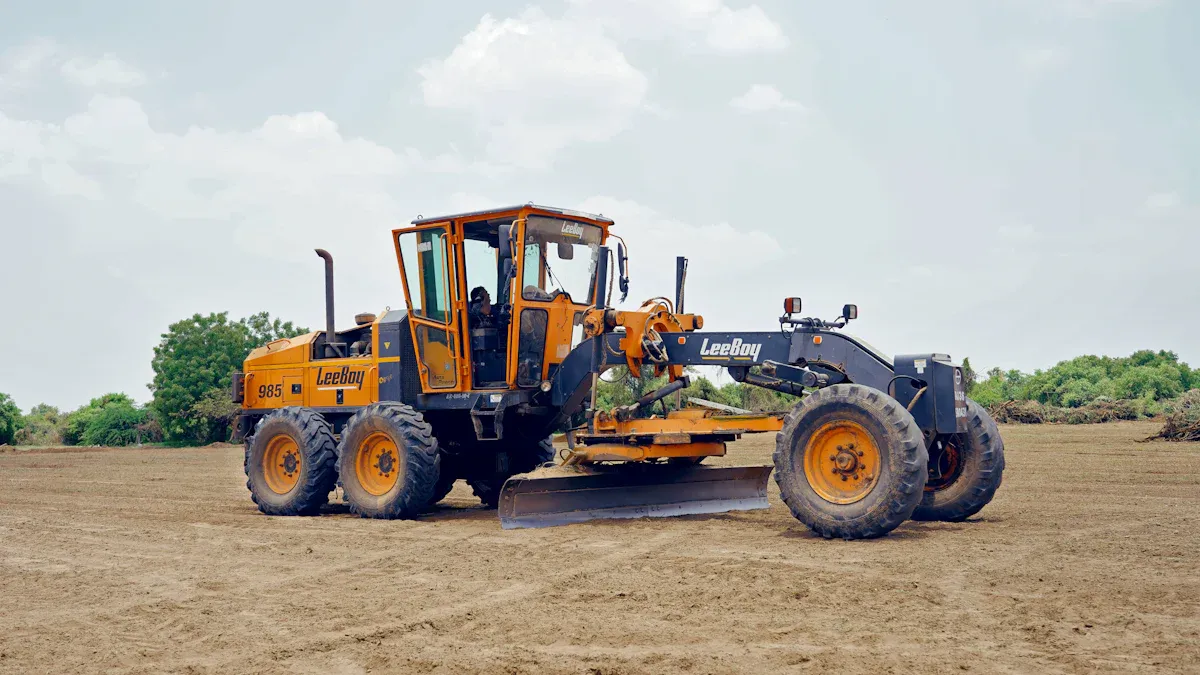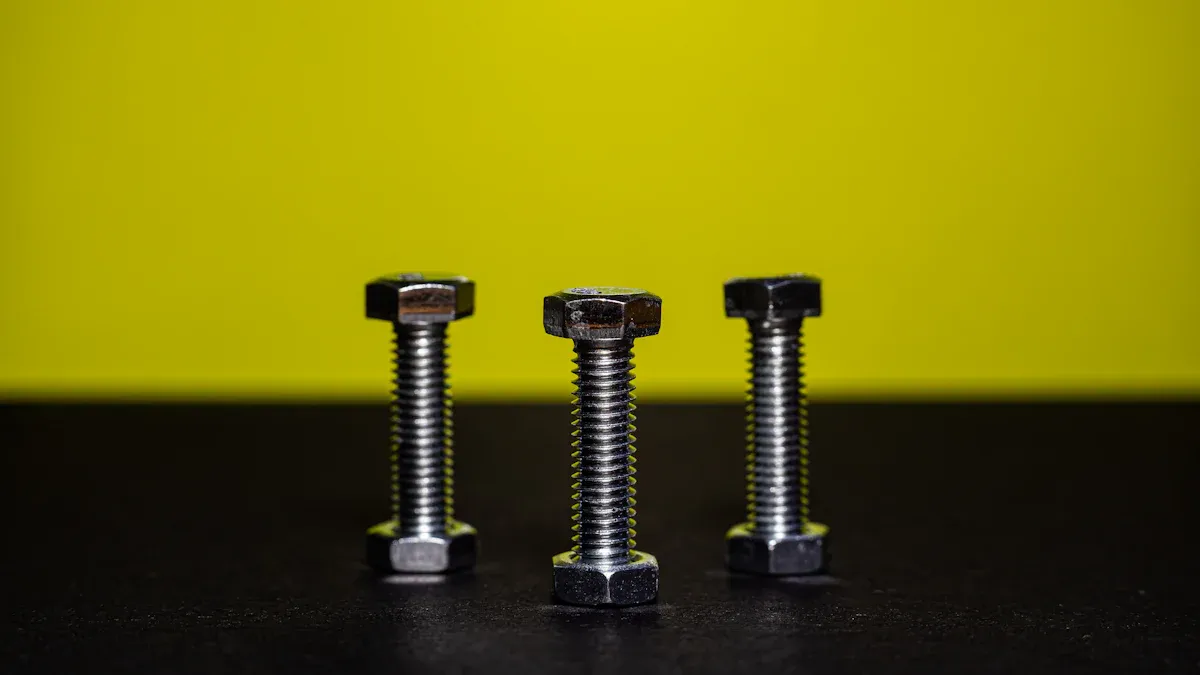
Selecting Agricultural Motor Grader Bolts requires careful attention to both strength and corrosion resistance. These bolts, as essential components of construction machinery, face heavy loads and harsh environments. The following table shows how different bolt materials influence equipment life and performance for agricultural motor grader blade bolts:
| Bolt Type | Application & Impact on Longevity |
|---|---|
| Grade 8 Alloy Steel | Delivers strength for heavy-duty tasks. Needs coatings to reduce rust and extend service life. |
| Zinc-Plated/Galvanized Carbon Steel | Offers moderate strength with good corrosion protection, ideal for wet or chemical exposure. |
| Stainless Steel | Excels in corrosion resistance, best for highly corrosive areas, but may lack strength for extreme loads. |
Key Takeaways
- Choose bolts that balance strength and corrosion resistance to ensure safe, long-lasting agricultural equipment.
- Match bolt materials and coatings to your field conditions, like using galvanized carbon steel for wet fields or stainless steel for high chemical exposure.
- Regularly inspect and maintain bolts to catch corrosion or wear early, preventing costly equipment failures and downtime.
Why Agricultural Motor Grader Bolts Need Both Strength and Corrosion Resistance
Application Demands in Agriculture
Agricultural machinery operates in some of the harshest environments. Fields often expose equipment to high soil moisture, fertilizers, and organic materials. These conditions accelerate corrosion on metal parts. Moisture acts as a primary accelerator, causing holes and cracks in bolts. Fertilizers with nitrogen compounds, such as ammonium nitrate and urea, react with steel, especially at bolt holes and welds. Manure and other organic materials release corrosive chemicals under humid conditions. In coastal areas, salt-laden air and high humidity increase the risk of red rust. These environmental factors compromise the reliability of Agricultural Motor Grader Bolts. Using corrosion-resistant materials and protective coatings, such as zinc plating or hot-dip galvanization, helps maintain bolt integrity and extends equipment life.
Note: Selecting bolts made from 316 stainless steel or using advanced coatings like Geomet can provide extra protection in chemically aggressive or coastal environments.
Consequences of Weak or Corroded Bolts
Weak or corroded bolts can lead to serious problems in agricultural machinery. Vibration from rough terrain loosens bolts, causing equipment malfunctions or failures. Regular tightening and inspection help prevent these issues, but the risks remain high if bolts lack strength or corrosion resistance.
- Loose bolts, nuts, and fasteners can cause equipment breakdowns and malfunctions.
- Deteriorated bolts result in capital loss, operational delays, and costly repairs.
- Corrosion increases tensile stresses, raising the risk of bolt failure, especially with low-grade steel.
- Corrosion products in crevices can further stress bolts, leading to failure under heavy loads.
- Structural failures may occur if weakened bolts or joint members lose stability.
Proper maintenance and the right choice of Agricultural Motor Grader Bolts reduce these risks, ensuring safe and reliable operation in the field.
Understanding Agricultural Motor Grader Bolts Grades and Strength Ratings
Common Grades Used in Agriculture
Agricultural Motor Grader Bolts must meet strict standards to ensure safety and performance. Manufacturers often use bolts that follow SAE and ISO grading systems. The most common grades in agriculture include SAE Grade 5 and Grade 8, as well as ISO Property Class 8.8 and 10.9. Each grade has a specific tensile strength, which measures how much force the bolt can handle before breaking. The table below shows the main grades, their strength, and typical uses:
| Standard | Grade/Class | Approximate Tensile Strength (psi) | Typical Applications |
|---|---|---|---|
| SAE J429 | Grade 5 | ~120,000 | Agricultural machinery, motor graders |
| SAE J429 | Grade 8 | ~150,000 | Heavy machinery, critical components |
| ISO 898-1 | Property Class 8.8 | ~120,000 | Automotive, heavy machinery |
| ISO 898-1 | Property Class 10.9 | ~150,000 | Military, aerospace, heavy machinery |
| ASTM A307 | Grade A | ~60,000 | General non-critical applications |
| ASTM A307 | Grade B | 60,000-100,000 | Flanged joints in piping systems |
| Stainless Steel | 304 | ~74,000 | Corrosion resistance, not for high strength |
| Stainless Steel | 316 | ~180,000 | Marine grade, corrosion resistant |
Tip: Always match the grade of replacement bolts to the original. Using a higher grade may seem safer, but it can make bolts more brittle and prone to snapping.
Interpreting Strength and Shear Ratings
Tensile strength tells how much pulling force a bolt can withstand before it fails. Shear strength measures the force needed to cut the bolt across its diameter. Both ratings are important for Agricultural Motor Grader Bolts, especially in heavy-duty fieldwork. Bolt head markings, such as slash marks, help identify the grade. Grade 5 bolts have three marks, while Grade 8 bolts have six. Stainless steel bolts resist corrosion but do not always offer higher strength than carbon steel bolts. The chart below compares the tensile strength of popular bolt grades:

Choosing the right grade ensures the bolts can handle both the load and the environment.
Materials for Agricultural Motor Grader Bolts

Carbon Steel Options
Manufacturers often choose carbon steel for Agricultural Motor Grader Bolts because it offers a balance of strength and cost. Carbon steel comes in three main types based on carbon content:
- Low carbon steel: More ductile and easy to form, but has lower tensile strength.
- Medium carbon steel: Offers good strength and machinability, making it suitable for bolts that need heat treatment.
- High carbon steel: Provides high hardness and toughness, but is harder to form or weld.
Most bolts in agricultural equipment use medium carbon steel. Grade 5 bolts, made from heat-treated medium carbon steel, deliver reliable performance in machinery. Grade 8 bolts, while often alloy steel, sometimes use high carbon steel for extra strength.
Alloy Steel for High Strength
Alloy steel bolts serve heavy-duty applications where maximum strength is required. Grade 8 bolts, commonly used in road graders and plows, use heat-treated alloy steel. This material increases tensile and proof load strength, making bolts less likely to fail under extreme loads. Alloy steel bolts meet standards like ASME B18.9, confirming their use in demanding agricultural and construction equipment.
Stainless Steel for Corrosion Resistance
Stainless steel bolts provide exceptional corrosion resistance in agricultural environments. The 300-series, such as 304 and 316, resist rust from moisture, fertilizers, and crop juices. 304 stainless steel contains chromium and nickel, which protect against most chemicals. 316 stainless steel adds molybdenum, improving resistance to chlorides and aggressive fertilizers. Stainless steel bolts cost more than carbon steel, but they last three to four times longer in corrosive conditions. They also require less maintenance and keep their shape over time, making them a smart choice for areas with high moisture or chemical exposure.
Coatings for Corrosion Resistance in Agricultural Motor Grader Bolts

Zinc Plating Benefits
Zinc plating offers a cost-effective way to protect bolts from rust. Manufacturers apply a thin layer of zinc to the surface of the bolt. This layer acts as a barrier between the steel and the environment. Zinc plating slows down the process of corrosion, especially in areas with moderate moisture. The coating also gives bolts a bright, clean appearance. Many choose zinc-plated bolts for general farm equipment because they balance protection and price. However, zinc plating can wear away over time, especially if the bolts face frequent abrasion or harsh chemicals.
Hot-Dip Galvanizing Advantages
Hot-dip galvanizing provides a thicker and more durable coating than zinc plating. In this process, manufacturers dip the bolts into molten zinc. The zinc forms a strong bond with the steel, creating a tough outer layer. This method works well for Agricultural Motor Grader Bolts used in wet or muddy fields. The galvanized coating resists scratches and stands up to rough handling. It also protects against rust even if the surface gets chipped. Hot-dip galvanized bolts last longer in outdoor and high-moisture environments. Farmers often select these bolts for equipment that stays outside year-round.
Specialized Agricultural Coatings
Some coatings go beyond traditional zinc or galvanizing. EquipCoat is one example designed for harsh agricultural settings. This factory-applied coating covers every surface of the bolt, sealing out moisture, manure, fertilizer, and brine. EquipCoat creates a barrier that prevents rust, oxidation, and fading. The coating holds up under pressure washing and daily use. Experts recommend EquipCoat for bolts exposed to high moisture because it reduces downtime and maintenance. Regular cleaning helps remove corrosive residues, but EquipCoat keeps protecting the bolts between washes. Farmers who use specialized coatings like EquipCoat see longer equipment life and fewer rust-related problems.
Comparing Materials and Coatings for Agricultural Motor Grader Bolts
Pros and Cons of Each Material
Choosing the right material for bolts impacts both performance and maintenance. Each steel type offers unique benefits and drawbacks. The table below summarizes the main points:
| Steel Type | Advantages | Disadvantages |
|---|---|---|
| Carbon Steel | - Naturally strong and hard - Easily machined - Relatively affordable |
- Poor corrosion resistance (prone to rust) - Less ductile at high carbon content - Not ideal for cold forming |
| Alloy Steel | - Improved corrosion resistance - Suitable for cold forming - Better ductility |
- Not as strong as carbon steel without heat treatment - More expensive than carbon steel |
| Stainless Steel | - Excellent corrosion resistance - Attractive shiny appearance |
- Generally lower strength and hardness - Suitable mainly for low-stress applications |
Stainless steel bolts, especially Grade 316, resist rust in salty or chemical-rich environments. Precipitation hardening stainless steels, such as 17-4PH, provide high strength and good corrosion resistance. Austenitic grades like 304 and 316 offer excellent corrosion protection but lower strength. Martensitic and ferritic grades deliver higher strength but less corrosion resistance.
Ningbo Digtech (YH) Machinery Co.,Ltd. supplies a full range of bolt materials, ensuring that customers can match the right steel type to their specific agricultural needs.
Best Material and Coating Combinations
Selecting the best combination of material and coating extends the life of Agricultural Motor Grader Bolts. The right pairing depends on the environment and the mechanical demands of the equipment.
- Carbon steel bolts with hot-dip galvanizing: This combination balances strength and corrosion resistance. The thick zinc layer protects against rust in wet or muddy fields. Farmers often choose this option for outdoor equipment.
- Alloy steel bolts with premium coatings: Alloy steels such as 4140 or 8740, paired with advanced coatings like Geomet or zinc-nickel, perform well under extreme mechanical stress. These coatings add a barrier against moisture and chemicals, reducing maintenance needs.
- Stainless steel bolts (Grade 316 or duplex) with polymer or powder coatings: Grade 316 stainless steel resists corrosion from salt and fertilizers. Duplex stainless steel offers both high strength and corrosion resistance. Adding a polymer or powder coating further shields the bolt from harsh chemicals and abrasion.
- Thermal spray coatings: These coatings provide durable protection against rust, wear, and chemicals. They work well in coastal or high-salinity regions where standard coatings may fail.
- E-coating and advanced powder coatings: E-coating creates a smooth, even finish that resists corrosion and looks appealing. Advanced powder coatings improve adhesion and protect bolt edges from corrosion.
Tip: In regions with high soil salinity, combining high-strength materials with premium corrosion-resistant coatings ensures the longest service life for bolts.
The table below compares common coating options and their impact on durability and maintenance:
| Coating Type | Durability Impact | Maintenance Impact | Suitable Environments/Notes |
|---|---|---|---|
| Zinc Plating | Economical corrosion protection; less durable in harsh conditions | Moderate maintenance; suitable for indoor/moderate environments | Indoor equipment; components requiring precise dimensions |
| Hot-Dip Galvanization | Thick sacrificial zinc layer; highly durable | Reduces corrosion-related maintenance; ideal for outdoor use | Outdoor, high humidity, harsh environments |
| Geomet & Zinc-Nickel | Premium corrosion resistance without dimension change | Extends service life; reduces downtime and risk of damage | Coastal, high-temperature, precision torque applications |
| Black Oxide | Mild corrosion resistance; good for internal use | Low maintenance for internal parts; helps reduce wear | Internal components; where appearance and precision matter |
| Polymer Coatings (e.g., Teflon) | Adds friction reduction and chemical resistance | Eases assembly/disassembly; lowers maintenance frequency | Equipment needing frequent maintenance; chemical exposure |
| Combined Coatings | Enhanced protection by layering (e.g., zinc-nickel + polymer) | Superior corrosion resistance and maintenance benefits | Challenging agricultural environments requiring maximum durability |
Ningbo Digtech (YH) Machinery Co.,Ltd. recommends evaluating both the environment and the expected service life before selecting a bolt and coating combination. Their experts help customers choose solutions that reduce downtime and extend equipment longevity.
Selecting the Right Agricultural Motor Grader Bolts for Your Application
Assessing Load and Environmental Requirements
Selecting bolts for agricultural machinery starts with understanding the demands of the equipment and the environment. Each machine faces unique stresses. Heavy graders and plows require bolts that can handle high loads and constant vibration. Wet fields, chemical fertilizers, and changing weather create harsh conditions that test the durability of every fastener.
Engineers and operators should first determine the maximum load each bolt will face. This includes both static loads from the weight of the equipment and dynamic loads from movement and vibration. Next, they must consider environmental factors. Moisture, fertilizers, and soil acidity can speed up corrosion. In coastal regions, salt in the air increases the risk of rust. Bolts exposed to these elements need extra protection.
Ningbo Digtech (YH) Machinery Co.,Ltd. recommends using bolts with proven strength ratings and corrosion-resistant coatings. Their experts help customers match bolt specifications to real-world field conditions, reducing the risk of failure.
Matching Bolt Properties to Field Conditions
Choosing the right bolt means matching its properties to the specific challenges of the field. Operators should look at both the material and the coating. For example, carbon steel bolts with hot-dip galvanizing work well in muddy or wet areas. Stainless steel bolts resist corrosion in places with high fertilizer use or salty air. Alloy steel bolts with advanced coatings handle heavy loads and frequent use.
A simple table can help compare options:
| Field Condition | Recommended Bolt Material & Coating |
|---|---|
| Wet or muddy fields | Carbon steel + hot-dip galvanizing |
| High fertilizer exposure | Stainless steel (316) + polymer coating |
| Heavy mechanical loads | Alloy steel + zinc-nickel or Geomet coating |
| Coastal or salty air | Duplex stainless steel + powder coating |
Operators should always check that the bolt grade matches the equipment’s requirements. Using the wrong grade can lead to early failure or safety risks. Consulting the equipment manual or a trusted supplier like Ningbo Digtech (YH) Machinery Co.,Ltd. ensures the right match for every application.
Tip: Regular inspections help spot early signs of corrosion or wear. Replacing bolts before they fail keeps equipment running safely.
Avoiding Common Selection Mistakes
Many equipment failures start with simple mistakes in bolt selection. Operators and maintenance teams can avoid these problems by following a few key steps:
- Choose bolts with the correct strength grade. Always match the standard (ISO for metric, ASTM for imperial) used by the equipment.
- Select materials that are compatible with both the equipment and the environment. For example, avoid mixing stainless steel with carbon steel, which can cause galvanic corrosion.
- Use coatings that protect against the specific threats in the field, such as zinc plating for moderate moisture or zinc flake for high chemical exposure.
- Do not ignore washers. Washers help distribute the load and prevent bolts from loosening during operation.
- Follow the equipment manual and consult with suppliers like Ningbo Digtech (YH) Machinery Co.,Ltd. for the correct bolt specifications.
- Schedule regular maintenance and inspections. Early detection of corrosion or loosening prevents costly breakdowns.
Common mistakes include:
- Neglecting corrosion resistance, which leads to fastener degradation and equipment failure.
- Using bolts with the wrong grade or incompatible materials.
- Selecting coatings that do not match the field conditions.
- Forgetting to use washers, which can result in uneven load distribution.
- Skipping regular inspections, allowing small issues to become major failures.
Note: Zinc and zinc flake coatings provide up to 1,000 hours of salt spray resistance. These coatings work well for bolts exposed to fertilizers and moisture.
By following these guidelines, operators can extend the life of their Agricultural Motor Grader Bolts and keep equipment running smoothly.
Consulting Experts on Agricultural Motor Grader Bolts
When to Seek Professional Guidance
Operators and maintenance teams often face challenges when choosing the right bolts for their equipment. They should seek expert advice in several situations. If the equipment operates in extreme environments, such as areas with high moisture or chemical exposure, professional input becomes essential. When upgrading machinery or switching to new bolt materials, consulting an expert helps avoid costly mistakes. Teams should also reach out when they notice repeated bolt failures or unusual wear patterns. Experts can analyze the problem and recommend better solutions.
Tip: Early consultation with a supplier or engineer can prevent equipment downtime and reduce repair costs.
Key Questions for Suppliers
Before purchasing bolts, teams should prepare a list of questions for suppliers. This ensures they receive the best product for their needs. Important questions include:
- What bolt grades and coatings do you recommend for my field conditions?
- Can you provide documentation on strength and corrosion resistance?
- How do your bolts perform in environments with high fertilizer or salt exposure?
- What maintenance schedule do you suggest for these bolts?
- Are there any compatibility issues with my current equipment?
A simple table can help teams organize supplier responses:
| Question | Supplier Response |
|---|---|
| Recommended grade/coating | |
| Corrosion resistance data | |
| Performance in harsh environments | |
| Maintenance recommendations | |
| Compatibility with existing equipment |
By asking these questions, teams make informed decisions and improve equipment reliability.
Selecting Agricultural Motor Grader Bolts with the right strength and corrosion resistance protects equipment from corrosion and mechanical failure.
- Proper bolt selection improves safety and efficiency.
- Advanced coatings and correct materials reduce maintenance costs and extend equipment life.
Consulting experts ensures reliable performance in demanding agricultural environments.
FAQ
What grade of bolt works best for heavy-duty agricultural motor graders?
Grade 8 alloy steel bolts provide the highest strength for heavy-duty graders. They resist high loads and vibration, making them ideal for demanding fieldwork.
How often should operators inspect bolts for corrosion or wear?
Operators should inspect bolts every season or after heavy use. Early detection of rust or damage prevents equipment failure and reduces repair costs.
Can stainless steel bolts replace carbon steel bolts in all applications?
Stainless steel bolts resist corrosion well. However, they may not match the strength of carbon steel bolts in high-load applications. Always check equipment requirements before switching materials.
Post time: Jul-15-2025